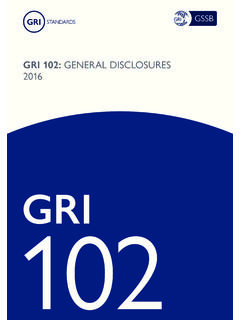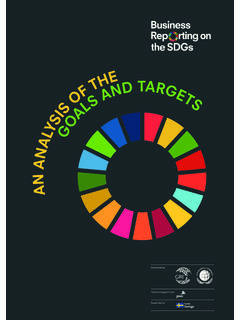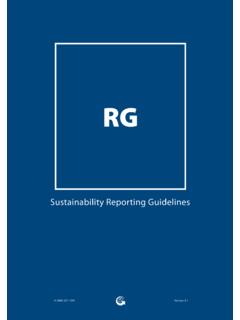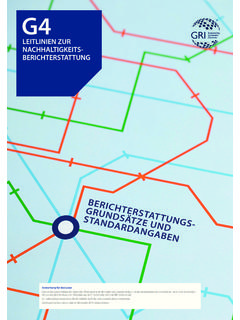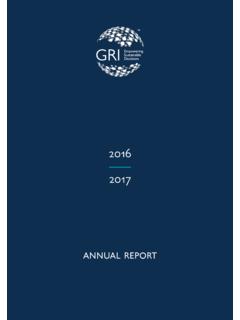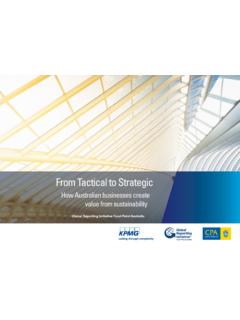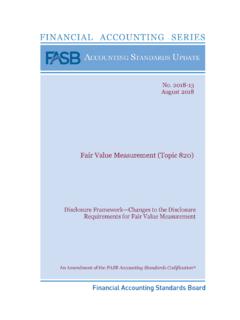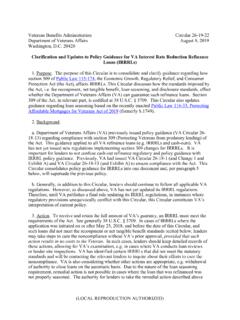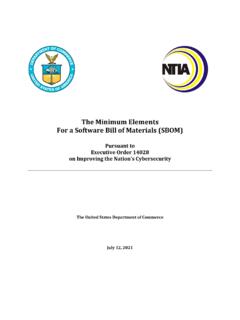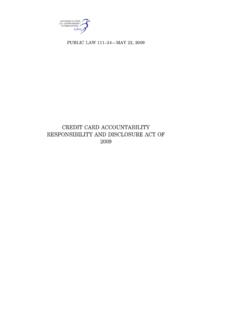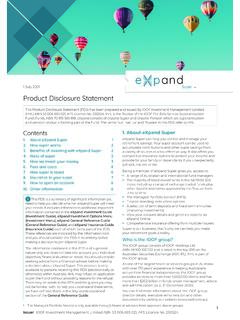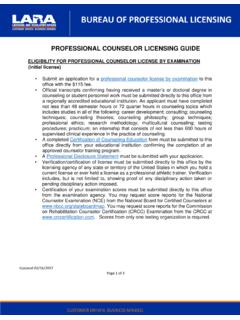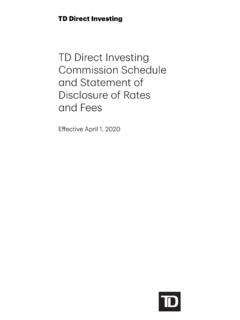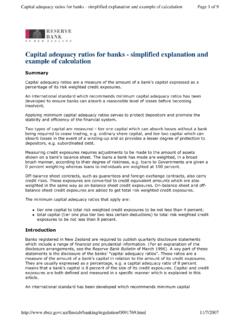Transcription of GRI 402: LABOR/MANAGEMENT RELATIONS 2016
1 GRI 402: LABOR/MANAGEMENT R EL AT I O N S 2016 GRI 4022 GRI 402: LABOR/MANAGEMENT RELATIONS 2016 ContentsIntroduction 3 GRI 402: LABOR/MANAGEMENT RELATIONS 51. Management approach disclosures 52. Topic-specific disclosures 6 Disclosure 402-1 minimum notice periods regarding operational changes 6 Glossary 7 References 9 ResponsibilityThis Standard is issued by the Global Sustainability Standards Board (GSSB). Any feedback on the GRI Standards can be submitted to for the consideration of the GSSB. ScopeGRI 402: LABOR/MANAGEMENT RELATIONS sets out reporting requirements on the topic of LABOR/MANAGEMENT RELATIONS . This Standard can be used by an organization of any size, type, sector or geographic location that wants to report on its impacts related to this referencesThis Standard is to be used together with the most recent versions of the following 101: FoundationGRI 103: Management Approach GRI Standards GlossaryIn the text of this Standard, terms defined in the Glossary are dateThis Standard is effective for reports or other materials published on or after 1 July 2018.
2 Earlier adoption is this Standard Note: This document includes hyperlinks to other Standards. In most browsers, using ctrl + click will open external links in a new browser window. After clicking on a link, use alt + left arrow to return to the previous 402: LABOR/MANAGEMENT RELATIONS 2016A. Overview This Standard is part of the set of GRI Sustainability Reporting Standards (GRI Standards). These Standards are designed to be used by organizations to report about their impacts on the economy, the environment, and GRI Standards are structured as a set of interrelated, modular standards. The full set can be downloaded at There are three universal Standards that apply to every organization preparing a sustainability report:GRI 101: FoundationGRI 102: General DisclosuresGRI 103: Management Approach An organization then selects from the set of topic-specific GRI Standards for reporting on its material topics.
3 These Standards are organized into three series: 200 (Economic topics), 300 (Environmental topics) and 400 (Social topics). Each topic Standard includes disclosures specific to that topic, and is designed to be used together with GRI 103: Management Approach, which is used to report the management approach for the Using the GRI Standards and making claims There are two basic approaches for using the GRI Standards. For each way of using the Standards there is a corresponding claim, or statement of use, which an organization is required to include in any published materials. 1. The GRI Standards can be used as a set to prepare a sustainability report that is in accordance with the Standards. There are two options for preparing a report in accordance (Core or Comprehensive), depending on the extent of disclosures included in the report. An organization preparing a report in accordance with the GRI Standards uses this Standard, GRI 402: LABOR/MANAGEMENT RELATIONS , if this is one of its material Selected GRI Standards, or parts of their content, can also be used to report specific information, without preparing a report in accordance with the Standards.
4 Any published materials that use the GRI Standards in this way are to include a GRI-referenced 402: LABOR/MANAGEMENT RELATIONS is a topic-specific GRI Standard in the 400 series (Social topics).GRI 101: Foundation is the starting point for using the GRI Standards. It has essential information on how to use and reference the Section 3 of GRI 101: Foundation for more information on how to use the GRI Standards, and the specific claims that organizations are required to include in any published materials. GRI 103 GRI 102 Topic-specificStandardsUniversal StandardsStarting point for using the GRI StandardsGRI 101 FoundationGeneral DisclosuresManagement ApproachTo report contextual information about an organizationTo report the management approach for each material topicSelect from these to report specific disclosures for each material topicGRI 300 EnvironmentalGRI 400 SocialGRI 200 EconomicFigure 1 Overview of the set of GRI Standards4 GRI 402: LABOR/MANAGEMENT RELATIONS 2016C.
5 Requirements, recommendations and guidance The GRI Standards include: Requirements. These are mandatory instructions. In the text, requirements are presented in bold font and indicated with the word shall . Requirements are to be read in the context of recommendations and guidance; however, an organization is not required to comply with recommendations or guidance in order to claim that a report has been prepared in accordance with the These are cases where a particular course of action is encouraged, but not required. In the text, the word should indicates a recommendation. Guidance. These sections include background information, explanations and examples to help organizations better understand the organization is required to comply with all applicable requirements in order to claim that its report has been prepared in accordance with the GRI Standards. See GRI 101: Foundation for more Background context In the context of the GRI Standards, the social dimension of sustainability concerns an organization s impacts on the social systems within which it 402 addresses the topic of LABOR/MANAGEMENT RELATIONS .
6 This covers an organization s consultative practices with employees and their representatives, including its approach to communicating significantoperational organization s consultation practices are expected to be aligned with relevant international norms and bargaining can play an important role in an organization s consultation practices. Collective bargaining refers to all negotiations which take place between one or more employers or employers' organizations, on the one hand, and one or more workers' organizations (trade unions), on the other, for determining working conditions and terms of employment or for regulating RELATIONS between employers and concepts are covered in key instruments of the International Labour Organization and the Organisation for Economic Co-operation and Development: see disclosures in this Standard can provide information about an organization s impacts related to LABOR/MANAGEMENT RELATIONS , and how it manages these on collective bargaining is covered in more detail in GRI 407: Freedom of Association and Collective Bargaining.
7 In addition, Disclosure 102-41 in GRI 102: General disclosures requires reporting on the percentage of total employees covered by collective bargaining This definition is based on the International Labour Organization (ILO) Convention 154, Collective Bargaining Convention , 402: LABOR/MANAGEMENT RELATIONS 2016 This Standard includes disclosures on the management approach and topic-specific disclosures . These are set out in the Standard as follows: Management approach disclosures (this section references GRI 103) Disclosure 402-1 minimum notice periods regarding operational changesReporting The reporting organization shall report its management approach for LABOR/MANAGEMENT RELATIONS using GRI 103: Management 402: LABOR/MANAGEMENT Relations1. Management approach disclosuresManagement approach disclosures are a narrative explanation of how an organization manages a material topic, the associated impacts, and stakeholders reasonable expectations and interests.
8 Any organization that claims its report has been prepared in accordance with the GRI Standards is required to report on its management approach for every material topic, as well as reporting topic-specific disclosures for those , this topic-specific Standard is designed to be used together with GRI 103: Management Approach in order to provide full disclosure of the organization s impacts. GRI 103 specifies how to report on the management approach and what information to 402: LABOR/MANAGEMENT RELATIONS 2016 Disclosure 402-1 minimum notice periods regarding operational changes2. Topic-specific disclosures Reporting requirements402-1 DisclosureGuidanceGuidance for Disclosure 402-1 minimum notice periods can be found in corporate policies and standard employment contracts. Differentpolicy statements can exist at a regional organization can identify the collective bargaining agreements referred to in Disclosure 102-41 of GRI 102: General disclosures , and review the notice period clauses within these are expected to provide reasonable notice of significant operational changes to employees and their representatives, as well as to appropriate government authorities.
9 minimum notice periods are a measure of an organization s ability to maintain employee satisfaction and motivation while implementing significant changes to disclosure provides insight into an organization s practice of ensuring timely discussion of significant operational changes, and engaging with its employees and their representatives to negotiate and implement these changes, which can have positive or negative implications for disclosure also allows an assessment of an organization s consultation practices in relation to expectations expressed in relevant international essence of consultation is that management takes the views of workers into account when making specific decisions. Therefore, it is important that consultation takes place before a decision is made. Meaningful consultation includes the timely provision of all information needed to make an informed decision to workers or their representatives.
10 Genuine consultation involves dialogue; opinion surveys and questionnaires are not considered and meaningful consultation allows the affected parties to understand the impacts of the changes, such as possible loss of employment. It also gives an opportunity for them to work collectively to avoid or mitigate negative impacts as much as possible (see references 11 and 12 in the References section). Consultative practices that result in good industrial RELATIONS help to provide positive working environments, reduce turnover, and minimize operational reporting organization shall report the following information:a. minimum number of weeks notice typically provided to employees and their representatives prior to the implementation of significant operational changes that could substantially affect For organizations with collective bargaining agreements, report whether the notice period and provisions for consultation and negotiation are specified in collective 402: LABOR/MANAGEMENT RELATIONS 2016 GlossaryThis Glossary includes definitions for terms used in this Standard, which apply when using this Standard.
